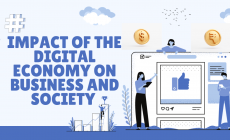-
UNION INTERIM BUDGET 2024-25 -
-
Are cryptocurrencies the future of the digital world economy -
-
Breaking Waves, Breaking News: Lakshadweep’s Recent Developments Explored -
-
The Impact of the Digital Economy on Business and Society -
-
Augmented Marketing: A Comprehensive Guide -
-
How To Strengthen Your Email Marketing Using AI -
-
How Artificial Intelligence and Digitization Are Transforming Our Lives -
-
What Data Science Tools do the Experts Recommend? -
-
Robotic Process Automation Will Transform Your Business? Check Here! -
-
Edge Computing: How it is Reshaping Cloud Infrastructure -
The Role of Technology in Healthcare: Opportunities and Challenges
Technology has had a profound impact on the healthcare industry in recent years, with new innovations continually emerging to improve patient outcomes and streamline care. However, as with any new development, there are also challenges to be faced in the integration of technology into healthcare. In this blog, we will explore the opportunities and challenges of technology in healthcare and how we can navigate these issues to build a more effective and equitable healthcare system.
The Growing Importance of Technology in Healthcare
The role of technology in healthcare has been growing in importance in recent years. With the advancement of digital technology, healthcare providers have been able to improve patient outcomes, streamline processes, and provide more efficient care. There are several factors contributing to the growing importance of technology in healthcare:
1- Increasing availability of data: With the rise of electronic health records (EHRs) and other digital health technologies, healthcare providers now have access to more patient data than ever before. This data can be used to inform clinical decision-making, monitor patient progress, and identify trends and patterns that can help providers deliver more personalized care.
2- The need for more efficient and effective healthcare solutions: The healthcare industry is facing increasing pressure to provide better outcomes at a lower cost. Technology can help in automating processes, reduce errors, and improve communication between providers, patients, and caregivers.
3- The rise of telemedicine: Advances in technology have made it possible for patients to receive care remotely through telemedicine. This has become especially important during the COVID-19 pandemic, allowing patients to access care from the safety of their homes.
4- The potential for personalized medicine: With the ability to collect and analyze large amounts of patient data, healthcare providers can now develop personalized treatment plans based on an individual’s unique health profile.
Opportunities for Improving Patient Outcomes with Technology
There are many opportunities for improving patient outcomes with technology in healthcare. Here are some examples:
1- Wearable devices: Wearable devices, such as fitness trackers and smartwatches, can monitor vital signs, track physical activity, and provide other health-related data. This data can be used to identify potential health issues, track progress, and provide personalized care.
2- Electronic health records (EHRs): EHRs can help healthcare providers to track patient information, access patient history, and share information between healthcare providers. This can lead to more coordinated care and better outcomes for patients.
3- Telemedicine: Telemedicine allows patients to receive care remotely, which can be especially useful for patients who live in rural areas or who have difficulty traveling to appointments. Telemedicine can also reduce healthcare costs and improve access to care.
4- Artificial intelligence (AI): AI can help healthcare providers to analyze large amounts of data and identify patterns that might be difficult to detect otherwise. This can help providers to make more accurate diagnoses and develop more effective treatment plans.
5- Mobile apps: Mobile apps can provide patients with educational resources, medication reminders, and other tools that can help them to manage their health more effectively. These apps can also help patients to communicate with their healthcare providers and access care more easily.
Challenges to Implementing Technology in Healthcare
While technology offers many opportunities to improve healthcare outcomes, there are also several challenges to implementing technology in healthcare settings. Here are some of the challenges that healthcare providers may face:
1- Cost: Implementing new technologies can be expensive, and healthcare providers may need to invest in new equipment, software, and training to use these technologies effectively. This can be especially challenging for small healthcare providers or those operating on limited budgets.
2- Interoperability: Healthcare providers often use multiple technology platforms, and these systems may not be compatible with one another. This can make it difficult to share patient data and coordinate care across different healthcare settings.
3- Training and education: Healthcare providers may not have the necessary training or education to use new technologies effectively. It can be challenging to keep up with the rapid pace of technological change, and healthcare providers may need ongoing training and support to stay up to date.
4- Data privacy and security: Healthcare providers need to ensure that patient data is kept secure and private. This can be especially challenging as more patient data is collected and stored electronically, and as the threat of data breaches and cyberattacks increases.
5- Resistance to change: Healthcare providers may be resistant to change, and may be hesitant to adopt new technologies if they perceive them as disruptive or time-consuming. This can be especially challenging in healthcare settings where there are long-standing traditions and practices.
6- Accessibility: Not all patients have equal access to technology or the internet, which can create disparities in healthcare access and outcomes. Healthcare providers need to ensure that they are using technology in a way that is accessible to all patients, regardless of their socioeconomic status or location.
Ethical Considerations in Healthcare Technology

As technology continues to play an increasingly important role in healthcare, it is important to consider the ethical implications of these technological advancements. Here are some of the ethical considerations in healthcare technology:
1- Patient privacy: Technology has made it easier to collect and store large amounts of patient data. This raises concerns about patient privacy and the potential for data breaches or misuse of patient data. Healthcare providers need to ensure that patient data is secure and that patients are informed about how their data will be used.
2- Bias in algorithms: Artificial intelligence (AI) and machine learning algorithms can be used to help healthcare providers make diagnoses and develop treatment plans. However, these algorithms may be biased against certain patient groups or may not take into account certain factors that could impact a patient’s health. Healthcare providers need to be aware of these biases and take steps to address them.
3- Patient autonomy: Patients should have the right to make decisions about their healthcare. However, as technology becomes more integrated into healthcare, patients may feel pressured to accept certain treatments or procedures based on the recommendations of AI algorithms or other technological tools. Healthcare providers need to ensure that patients are informed about their options and can make their own decisions.
4- Impact on the physician-patient relationship: Technology can make it easier for patients to access care and communicate with their healthcare providers. However, it can also create a barrier between patients and their providers, leading to a loss of personal connection and empathy. Healthcare providers need to ensure that technology is used in a way that supports, rather than detracts from, the physician-patient relationship.
5- Equity: There are concerns that technology may exacerbate existing disparities in healthcare access and outcomes. For example, patients in rural or low-income areas may not have access to the same technological tools as patients in more affluent areas. Healthcare providers need to ensure that technology is implemented in a way that does not exacerbate existing inequalities.
The Future of Healthcare: How Technology Will Continue to Transform the Industry
The future of healthcare is closely tied to the continued development and implementation of technology. Here are some ways that technology is likely to transform the healthcare industry in the years to come:
1- The Internet of Medical Things (IoMT): The IoMT refers to the network of medical devices, wearable sensors, and other healthcare-related objects that are connected to the Internet. The IoMT has the potential to revolutionize healthcare by enabling real-time monitoring of patient health and providing healthcare providers with a wealth of data that can be used to improve patient outcomes.
2- Precision medicine: Precision medicine is an approach to healthcare that takes into account individual variations in genetics, environment, and lifestyle to develop personalized treatment plans. Advances in technology, including genomics and AI, are making it possible to develop more precise treatments that can be tailored to individual patients.
3- Robotics and automation: Robotics and automation have the potential to improve efficiency and reduce errors in healthcare. For example, robots can be used to perform surgery with greater precision and accuracy than human surgeons. Automated systems can also be used to manage inventory, schedule appointments, and perform other administrative tasks.
4- Virtual reality (VR) and augmented reality (AR): VR and AR can be used to provide immersive training experiences for healthcare providers, simulate medical procedures, and help patients manage pain and anxiety. These technologies can also be used to create virtual environments that allow patients to interact with healthcare providers remotely.
5- Blockchain: Blockchain technology has the potential to improve data security and privacy in healthcare through creating a secure and transparent system for storing and sharing patient data. This technology can also be used to streamline administrative processes and reduce healthcare costs.































